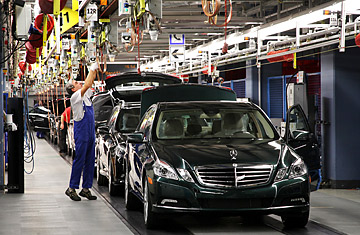
Daimler AG division Mercedes-Benz's production line in Stuttgart, Germany
Why must Daimler AG, the German automaker, pay big fines to the U.S. government because two of its subsidiaries, one in Germany and the other in Russia, made improper payments to government officials of countries other than the U.S., such as China, Egypt and Serbia?
Welcome to the age of the Foreign Corrupt Practices Act (FCPA), a far-reaching bit of American legislation that cracks down on corporate bribery in all its forms and is rattling the cages of corporate chiefs the world over. The Department of Justice (DOJ) has jurisdiction over all related criminal violations under the act, and the Securities and Exchange Commission (SEC) keeps tabs on the civil violations committed by U.S. companies. What's more, the law doesn't just mean the U.S. government is looking for past incidents of corruption; it's also stirring the pot to see who may be corruptible in the future.
Consider the case of Pat Caldwell. In January 2009, after 27 years in the U.S. Secret Service, Caldwell became head of sales and marketing for Protective Products of America Inc. (PPA), a Florida firm that sells body armor to federal and state agencies.
Just five months later, the U.S. government was selling Caldwell a deal — one he should have refused — to help equip the presidential guard of an African country for about $15 million. The offer came from two undercover FBI agents posing as the sales broker and representative of an African defense minister, in meetings at Miami's Mandarin Oriental hotel and at Clyde's restaurant in Washington, D.C. The catch: there was a 20% commission tacked onto the real price as a kickback for the two men.
Caldwell went for it, the U.S. alleges in a recently unsealed indictment. After $18,000 was wired to a PPA bank account as a test purchase, the first batch of 50 body-armor plates (from a total order of 3,600) were shipped off — on July 16, the same day Caldwell was promoted to CEO. Caldwell proved to have a very short stint as PPA chief, as the African deal soon blew up in his face. He was arrested in January this year along with 21 executives of other law-enforcement and military-supply companies — most of whom were conveniently gathered at a Las Vegas trade show — who all allegedly fell for the same false honey pot. Caldwell has pleaded not guilty to the charges.
The raid, in which 150 FBI agents fanned out across the country to execute search warrants, was a dramatic demonstration of the government's new resolve to crack down on violations of the Foreign Corrupt Practices Act, which has largely lain dormant since becoming law in 1977. In fact, it was the first time Washington had used a sting operation to enforce this law — part of what Justice Department officials vow is a "new chapter" in white-collar crime enforcement. "The message is that we are going to bring all the innovations of our organized-crime and drug-war cases to fight against white-collar criminals," Lanny A. Breuer, a senior Justice official, told the American Bar Association recently.
The evidence of Washington's determination is a mounting pile of enforcement fines. In 2007, FCPA-related fines — paid to the Justice Department and the SEC to settle civil charges — were $87 million. Last year this rose to $627 million and then it doubled to $1.2 billion in just the first two months of 2010. Now you can also add the $185 million in civil and criminal penalties that Daimler AG and its subsidiaries have agreed to pay.
And the Justice Department is just getting started. The post-9/11 creation of a new national-security division within Justice freed up more resources for the criminal division and its fraud section. There are now eight full-time FCPA prosecutors supplemented by 54 other prosecutors in the fraud section. The same is true of the FBI, which performs the actual gumshoe investigation; a new Washington field-office unit has 10 agents working exclusively on FCPA. More prosecutors and agents are expected to be added, paid for indirectly by the huge new income stream these fines represent (fines go into the Treasury, not directly back to the DOJ). There are currently about 150 investigations under way, some targeting foreign firms listed on U.S. exchanges, such as the just concluded Daimler AG case.
